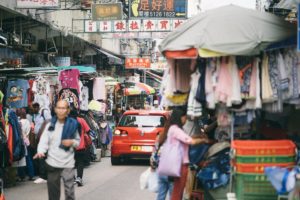Blog
Building Security and Development in an Uncertain World Requires Integrated Approaches – and Ideas
Written by Katie Fettes, Eliz Peck and Andrea Naranjo
April 8, 2019
“We need to develop an unflinching ability to look at reality no matter the costs,” Rory Stewart, MP, told guests during his keynote at the sixth annual Conflict, Security and Development Conference at King’s College London. On 7-8 March, “Building Stability: Security and Development Futures in an Uncertain World” brought together leading thinkers and practitioners with 200+ attendees. This year, panellists included Joëlle Jenny, Director of the Joint Funds Unit at the FCO, Sinéad Magill, Europe, Middle East and Africa Director at Palladium, Ben Le Roith, Group Head of Extreme Poverty and Southern Africa at DfID, Sandrine Tiller of MSF, and many more!
Global trends including environmental degradation, state fragility and democratic decline are taking place against a global shift from states to networks. This also includes a transition from the national to the local, and from East to West. An outstanding group of speakers from across the public, private and non-profit sectors explained how each sector is adapting and responding to uncertainty.
Keynotes: Rory Stewart, MP, and Natasha Walter, Founder and Director of Women for Refugee Women
Mr. Stewart’s address used the case of South Sudan to highlight the need for alignment with local context in all international engagement. For example, the country’s internationally-shaped National Development Strategy omits cattle. Yet the cow is absolutely central to the country’s politics, economics, and culture. International actors, says Stewart, speak to other international actors instead of to local realities. Ms. Natasha Walter, Founder and Director of Women for Refugee Women, gave our International Women’s Day address. She urged renewed energy in the movement for gender equality as an intersectional and revolutionary movement. Stability, security and development will not be possible without the empowerment of women and girls globally.
Panel 1: Private Investment in Fragile States
Friday’s first panel discussed private investment in fragile states. The private sector will play a key role in delivering the Sustainable Development Goals (SDGs), but the structural challenges are significant. The world’s poorest are increasingly concentrated in fragile states. However, these are seen as the riskiest locations for private investment. State effectiveness is vital to ensuring that the private sector can deliver on its role in producing inclusive growth and development. Investing in local financial institutions can build state capacity. In addition approaches such as encouraging investment down the supply chain of established companies can push the boundaries of private investment into riskier contexts. As such, development actors need to reconceptualise return on investment.
Panel 2: The Future of Aid
Our second panel tackled the future of development and humanitarian aid. The panellists discussed the shift towards solidarity, but noted that this must include renewed domestic support for aid flows to continue. While aid is often justified to domestic publics in terms of national security, addressing the security challenges of the poorest countries needs to be seen in a broader light. It is not in the interest of one or the other country, but both. Donors will continue to play discursive, catalysing and convening roles in development. In the context of the increasing focus on metrics, impact should be measured by outcomes rather than inputs. Responsible exit strategies are required from the beginning. However, they are challenging to implement in the context of increasingly intractable situations. There was optimism surrounding the shift away from Western hegemony towards global solidarity, meaningful partnerships, and local ownership of international programs.
Panel 3: Building Local Resilience – Environment, Population, Food and Water
Our third panel focused on the nexus between poverty, food and water insecurity, climate change and conflict as a leading security and development challenge. Home to ⅓ of the world’s population, semi-arid countries are particularly vulnerable to the complex challenges arising from this nexus. They are hard hit by climate change and often the least equipped to fight back. Moreover, population growth is straining increasingly scarce resources. Unprecedented migration and rapid urbanisation are further outpacing infrastructure development and policy response. This panel advocated risk-informed frameworks, interdisciplinary work, and systems thinking. Panellists noted that we need to build systems that are responsive to shocks. What’s more, we need to focus on climate mitigation in developed countries and adaptation in developing countries.
Panel 4: Belt and Road – China’s Rise as a Development Actor
Our fourth panel addressed China’s role as a rising actor in global development. China’s ambitious Belt and Road Initiative (BRI) cements the nation’s influence on the development landscape. While China provides African countries with choice, they must carefully consider the implications of such partnership and avoid becoming reliant on Chinese loans. The conversation on China in Africa has shifted from extractives to foreign direct investment (FDI). Our panel predicted that China will soon dominate FDI on the continent. Despite China’s dominant global economic position, the country has avoided being politically assertive to suit its strategic interests.
Professor ‘Funmi Olonisakin, Vice-President and Vice-Principal International at King’s, inspired attendees with her closing remarks. Olonisakin encouraged us to study and engage with the ‘future people’ . These are young people who will be governing our world in 2050. She also urged attendees to find innovative solutions that can ‘un-entrench’ today’s global inequalities.
The discussions were as nuanced and diverse as the challenges we face today. Key take-aways included the need for hopeful realism, collaboration and partnership, and systems-thinking to build stability in an uncertain world.
We thank all of those who made this forum possible. You can find a full list of our speakers and sponsors at www.csdconference2019.com.

